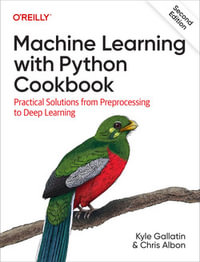
At a Glance
230 Pages
22.86 x 15.24 x 1.75
Hardcover
$194.32
or 4 interest-free payments of $48.58 with
orAims to ship in 7 to 10 business days
Industry Reviews
'This is a beautifully written book that I recommend to anyone who is interested in understanding the 'what,' 'how,' and 'why' of decision theory. The balance between conceptual issues, formalism, and philosophical underpinnings is unique. It will become a standard reference and text.' Larry Epstein, Boston University
'With his seminal works, Itzhak Gilboa is one of the leading figures in the 'neoclassical' decision theory that in the past 20 years has considerably expanded the scope of the classical theory pioneered by de Finetti, Ramsey, Savage, and von Neumann. This book provides a superb and much-needed introduction to this exciting research area.' Massimo Marinacci, Collegio Carlo Alberto, Italy
'At the heart of most economic analysis is a description of how individuals make decisions. There have been fundamental advances in our understanding of decision making in recent years, and this book provides an extremely accessible explanation of the current state of the field. Perhaps more importantly, it lays out the conceptual underpinnings of decision theory: why the various assumptions in modeling decision making are made and how they affect economic predictions.' Andrew Postlewaite, University of Pennsylvania
'Expected utility theory underlies most of statistics, economics, and finance. But are utility functions and probabilities all that we need to formulate wise decisions? And where do utility functions and probabilities come from? Written by the distinguished creator of new decision theories Itzhak Gilboa, Decision Theory under Uncertainty is a beautifully written critical account of decision theory that answers these and other important questions. Gilboa's work opens doors for both theorists and applied workers.' Thomas Sargent, New York University
'[Gilboa] provides a textbook, but mathematically sophisticated, treatment of the recent developments in Choquet expected utility theory, prospect theory, and maxmin expected utility theory.' History of Economic Thought and Policy
| Preface | p. xiii |
| Intuitive Definitions | p. 1 |
| Motivating Examples | p. 3 |
| Free Will and Determinism | p. 5 |
| Can Free Choice Be Predicted? | p. 5 |
| Is the World Deterministic? | p. 5 |
| Is Free Will Observable? | p. 6 |
| The Problem of Free Will | p. 7 |
| A Rational Illusion | p. 10 |
| Free Will and the Decision Matrix | p. 12 |
| The Principle of Indifference | p. 14 |
| Will a Canonical Space Help? | p. 14 |
| The Canonical State Space | p. 14 |
| Difficulties with a Uniform Prior on [0,1] | p. 15 |
| Conclusion | p. 16 |
| What's Special about the Coin? | p. 17 |
| Symmetry | p. 17 |
| Smooth Beliefs | p. 18 |
| Relative Frequencies | p. 20 |
| The Law of Large Numbers | p. 20 |
| The Problem of Induction | p. 21 |
| Hume's Critique | p. 21 |
| Goodman's Grue-Bleen Paradox | p. 21 |
| Kolmogorov Complexity and Its Dependence of Language | p. 23 |
| Grue-Bleen Again | p. 26 |
| Evolutionary Explanations | p. 31 |
| Problems with the Frequentist Approach | p. 34 |
| Subjective Probabilities | p. 37 |
| Linda the Bank Teller | p. 37 |
| Pascal's Wager | p. 38 |
| Classical versus Bayesian Statistics | p. 40 |
| Basic Definitions | p. 40 |
| The Gambler Fallacy | p. 41 |
| Exchangeability | p. 42 |
| Confidence Is Not Probability | p. 44 |
| Classical Statistics Can Be Ridiculous | p. 45 |
| Different Methods for Different Goals | p. 46 |
| Behavioral Definitions | p. 49 |
| A Case Study | p. 51 |
| A Characterization Theorem for Maximization of Utility | p. 51 |
| Proof | p. 53 |
| Interpretations | p. 55 |
| A Few Definitions | p. 56 |
| A Meta-Scientific Interpretation | p. 59 |
| A Normative Interpretation | p. 62 |
| A Descriptive Interpretation | p. 63 |
| Limitations | p. 64 |
| Semiorders | p. 65 |
| Other Ways to Measure Utility | p. 71 |
| The Role of Theories | p. 72 |
| Theories Are Always Wrong | p. 72 |
| Theories and Conceptual Frameworks | p. 74 |
| Logical Positivism as a Metaphor | p. 76 |
| Von Neumann-Morgenstern's Theorem | p. 78 |
| Background | p. 78 |
| The Theorem | p. 79 |
| Proofs | p. 83 |
| The Algebraic Approach | p. 83 |
| A Geometric Approach | p. 84 |
| A Separation Argument | p. 85 |
| The Three Interpretations | p. 86 |
| De Finetti's Theorem | p. 89 |
| Motivation | p. 89 |
| The Theorem | p. 90 |
| A Proof | p. 91 |
| The Three Interpretations | p. 92 |
| Savage's Theorem | p. 94 |
| Background | p. 94 |
| States, Outcomes, and Acts | p. 96 |
| Axioms | p. 97 |
| P1 | p. 97 |
| P2 | p. 97 |
| Notation | p. 99 |
| Null Events | p. 99 |
| P3 | p. 100 |
| P4 | p. 102 |
| P5 | p. 102 |
| P6 | p. 103 |
| P7 | p. 104 |
| The Result for a Finite Outcome Set | p. 105 |
| Finitely Additive Measures | p. 105 |
| Nonatomic Measures | p. 107 |
| The Theorem | p. 108 |
| The Case of a General Outcome Set | p. 108 |
| Interpretations | p. 109 |
| The Proof and Qualitative Probabilities | p. 110 |
| The Definition of States | p. 113 |
| Causality | p. 113 |
| Newcomb's Paradox | p. 113 |
| States as Functions from Acts to Outcomes | p. 114 |
| A Problem | p. 115 |
| Hempel's Paradox of Confirmation | p. 116 |
| Are All Ravens Black? | p. 116 |
| A State-Space Formulation | p. 117 |
| What Is a Confirmation? | p. 117 |
| A Resolution | p. 118 |
| Good's Variation | p. 118 |
| What Do We Learn from This? | p. 119 |
| Monty Hall Three-Door Game | p. 120 |
| A Critique of Savage | p. 123 |
| Criticizing Critiques | p. 123 |
| An Example | p. 123 |
| The General Lesson | p. 124 |
| Critique of P3 and P4 | p. 125 |
| Example | p. 125 |
| Defense | p. 126 |
| State-Dependent Utility | p. 127 |
| The Definition of Subjective Probability | p. 128 |
| When Is State Dependence Necessary? | p. 129 |
| Critique of P1 and P2 | p. 130 |
| The Basic Problem | p. 130 |
| Reasoned Choice versus Raw Preferences | p. 131 |
| Schmeidler's Critique and Ellsberg's Paradox | p. 132 |
| Observability of States | p. 136 |
| Problems of Complexity | p. 137 |
| Objectivity and Rationality | p. 138 |
| Subjectivity and Objectivity | p. 138 |
| Objective and Subjective Rationality | p. 139 |
| Anscombe-Aumann's Theorem | p. 142 |
| Alternative Behavioral Theories | p. 145 |
| Choquet Expected Utility | p. 147 |
| Schmeidler's Intuition | p. 147 |
| Choquet Integral | p. 149 |
| Comonotonicity | p. 150 |
| Axioms and Result | p. 151 |
| Prospect Theory | p. 154 |
| Background | p. 154 |
| Gain-Loss Asymmetry | p. 154 |
| Distortion of Probabilities | p. 156 |
| Rank-Dependent Probabilities and Choquet Integration | p. 158 |
| Maxmin Expected Utility | p. 160 |
| Convex Games | p. 160 |
| A Cognitive Interpretation of CEU | p. 161 |
| Axioms and Result | p. 163 |
| Interpretation of MMEU | p. 163 |
| Generalizations and Variations | p. 165 |
| Bewley's Alternative Approach | p. 165 |
| Combining Objective and Subjective Rationality | p. 166 |
| Applications | p. 168 |
| Cognitive Origins | p. 171 |
| Case-Based Qualitative Beliefs | p. 173 |
| Axioms and Result | p. 173 |
| Four Known Techniques | p. 173 |
| The Combination Axiom in General Analogical Reasoning | p. 177 |
| Violations of the Combination Axiom | p. 179 |
| Frequentism Revisited | p. 180 |
| Similarity-Weighted Empirical Frequencies | p. 180 |
| Intuition | p. 181 |
| Axiomatization | p. 182 |
| Empirical Similarity and Objective Probabilities | p. 184 |
| Future Research | p. 188 |
| References | p. 191 |
| Index | p. 199 |
| Table of Contents provided by Ingram. All Rights Reserved. |
ISBN: 9780521517324
ISBN-10: 052151732X
Series: Econometric Society Monographs
Published: 28th May 2009
Format: Hardcover
Language: English
Number of Pages: 230
Audience: College, Tertiary and University
Publisher: Cambridge University Press
Country of Publication: GB
Dimensions (cm): 22.86 x 15.24 x 1.75
Weight (kg): 0.43
Shipping
| Standard Shipping | Express Shipping | |
|---|---|---|
| Metro postcodes: | $9.99 | $14.95 |
| Regional postcodes: | $9.99 | $14.95 |
| Rural postcodes: | $9.99 | $14.95 |
How to return your order
At Booktopia, we offer hassle-free returns in accordance with our returns policy. If you wish to return an item, please get in touch with Booktopia Customer Care.
Additional postage charges may be applicable.
Defective items
If there is a problem with any of the items received for your order then the Booktopia Customer Care team is ready to assist you.
For more info please visit our Help Centre.
You Can Find This Book In

The Closing of the Auditor's Mind?
How to Reverse the Erosion of Trust, Virtue, and Wisdom in Modern Auditing
Hardcover
RRP $231.00
$163.50
OFF

The Closing of the Auditor's Mind?
How to Reverse the Erosion of Trust, Virtue, and Wisdom in Modern Auditing
Paperback
RRP $94.99
$74.25
OFF

Machine Learning with Python Cookbook
2nd Edition - Practical Solutions from Preprocessing to Deep Learning
Paperback
RRP $152.00
$66.25
OFF





















